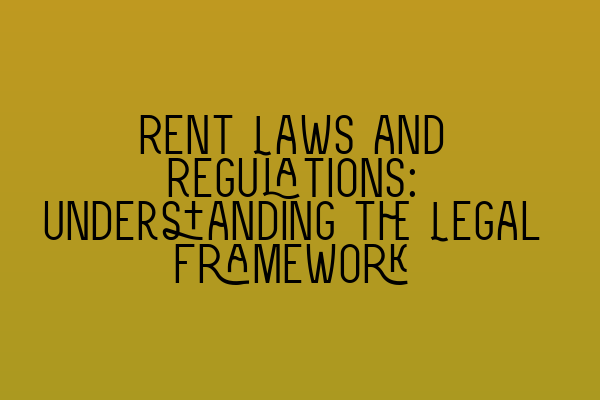Rent Laws and Regulations: Understanding the Legal Framework
1. Introduction to Rent Laws
When it comes to renting a property, it is important for both landlords and tenants to have a clear understanding of the legal framework surrounding rent laws and regulations. These laws are designed to protect the rights and interests of both parties, ensuring a fair and balanced rental relationship. In this article, we will explore the key aspects of rent laws and regulations, empowering landlords and tenants with the knowledge they need to navigate the rental landscape.
2. Types of Rent Laws
Rent laws can vary depending on the jurisdiction, but they generally fall under two main categories:
- Tenant Protection Laws: These laws are put in place to safeguard tenants from unfair practices, such as illegal evictions, discriminatory rental practices, and unreasonable rent increases. They outline the rights and responsibilities of both tenants and landlords, establishing a harmonious rental relationship.
- Landlord Rights Laws: While tenant protection laws mainly focus on safeguarding tenants, landlord rights laws protect the interests of property owners. These laws include provisions related to property maintenance, rent collection, and the eviction process. They aim to ensure that landlords can effectively manage their properties and protect their investments.
3. Understanding Rent Control
Rent control is a specific form of rent regulation that limits the amount a landlord can increase the rent for a particular property. Rent control laws vary greatly depending on the jurisdiction, with some locations implementing strict rent control measures, while others have no rent control regulations at all.
The purpose of rent control is to provide affordable housing options for tenants, especially in areas where housing costs have skyrocketed. However, it is essential for both landlords and tenants to understand the specific rent control laws in their region, as they may have limitations on rent increases or additional requirements for landlords.
4. Security Deposits and Rent Increase Regulations
In many jurisdictions, there are specific regulations governing security deposits and rent increases. These regulations aim to ensure that tenants are not unfairly burdened by excessive security deposit requirements or sudden and unreasonable rent hikes.
Landlords typically have guidelines on the maximum amount they can charge for a security deposit, as well as restrictions on how and when they can increase the rent. It is crucial for landlords to familiarize themselves with these regulations to avoid legal complications and disputes with tenants.
5. Evictions and Lease Termination
In cases where a rental agreement needs to be terminated, both landlords and tenants must follow the legally prescribed eviction process. This process ensures that both parties have a fair chance to resolve any issues or disputes before resorting to eviction.
Eviction laws outline the necessary steps, such as providing written notices, filing court actions, and obtaining eviction orders. It is vital for landlords to adhere to these legal procedures to protect themselves from potential legal repercussions. Likewise, tenants should understand their rights and obligations when faced with eviction, seeking legal advice if needed.
6. Access to Legal Support
Dealing with rent laws and regulations can be complex, and it is essential for landlords and tenants to have access to legal support when necessary. Consulting with a qualified property law solicitor can provide invaluable guidance and ensure compliance with relevant laws.
A property law solicitor can assist landlords in drafting legally sound rental agreements, understanding their obligations, and navigating the complexities of eviction proceedings. Likewise, tenants can benefit from legal advice in negotiating fair lease terms, asserting their rights, and addressing potential housing code violations.
7. Conclusion
Understanding the legal framework surrounding rent laws and regulations is crucial for both landlords and tenants. By familiarizing themselves with the applicable laws, both parties can protect their rights and interests, establish fair rental agreements, and prevent legal disputes.
Remember, rent laws and regulations may vary depending on the jurisdiction, so it is important to consult with a property law solicitor to ensure compliance with the specific regulations in your area.
This blog post is intended for informational purposes only and should not be construed as legal advice. For legal guidance related to rent laws and regulations, please consult with a qualified property law solicitor.
